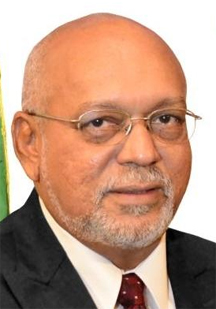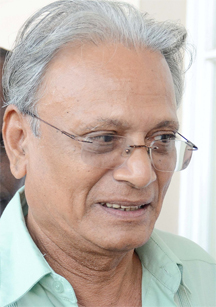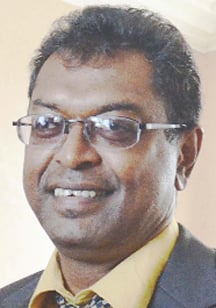The opposition parties, APNU and AFC, are open to consultations with the government on legislation they plan to bring to the National Assembly but say that the same courtesy would have to be extended to them.
Last week, President Donald Ramotar said that he will not assent to any bill passed by the opposition without government input. “I am making it very clear that I will not assent to any bill that they carry unless it is with the full agreement of the Execu-tive and the full involvement of the Executive”, the president stated in an interview with the state-owned NCN.
Vice-Chairman of APNU, Dr. Rupert Roopnaraine, when contacted on Saturday, said that Ramotar is well within his constitutional right to refuse to assent to bills passed by the opposition without government input. He said “consensus” legislation would be best for the country. “That to my mind is not an unexpected position of the president,” Dr. Roopnaraine told Stabroek News. He pointed out that while the combined opposition can pass bills, the president has to assent to the bills for them to become law. If the president is not in agreement with a bill, he can send it back to the National Assembly along with his reasons. Thereafter, for the bill to become law, a two-thirds majority of the National Assembly would have to vote in support of it and the president would then be required to assent to it.

The combined opposition holds a one-seat majority in the 65-seat National Assembly and the hung Parliament has left both sides at a quintessential standoff making two-thirds support for any bill that is opposed by one of the two major parties unlikely. The government cannot pass bills unless it secures an opposition vote and while the opposition can present and pass legislation with its wafer-thin majority it won’t become law unless signed by the President.
It would be “practical” to engage the government on proposed legislation, said Dr. Roopnaraine. “It has to work the other way around,” he added. The more consensus legislation that is passed, the better it would be for the country, he said.
AFC Chairman, Khemraj Ramjattan while questioning what the president meant said that the government would have the opportunity to make its input when a bill is laid in parliament. “By its very nature, our legislative process means that the president will have to know,” he said, pointing out that “the world” is notified when a bill is laid in the National Assembly and then there are three readings of a bill and amendments can be tabled and members can even request that it be sent to a special select committee.

Ramjattan questioned whether Ramotar meant that opposition members would have to notify the Office of the President and gain approval before they take a bill to the National Assembly and declared that he is opposed to this. He noted that in the past, the opposition only learnt of many government bills when they are laid in the House. However, he said that if the ruling party is prepared to extend the same courtesy to the opposition parties on bills that the president seems to be suggesting, then he would have no problem with it. “I would be in support of that if indeed the president tells us in the legislative branch that his party is going to adhere to that pre-consultation before they bring a bill,” he said.
Ramjattan expressed surprise at the president’s position while denouncing it as “unfortunate” and “ill-advised.” He pointed out that members of the executive branch-including ministers- would be dealing with bills in the National Assembly and would have the opportunity to bring amendments, debate it and argue for or against a bill or even request that it be sent to a special select committee.

He said that the “condition” that Ramotar seems to be suggesting was not something that the PPP practiced with the opposition in the past. When the ruling party laid bills in the House, it was studied and the members argued their position during the debates and supported it or not depending on whether they felt it was a good bill, he recalled. The PPP did not consult with the opposition before they laid their bills in the National Assembly, he noted.
Now, the AFC Chairman said, “he (Ramotar) wants to know what we are thinking before we even lay it in parliament.” According to Ramjattan it is a “puerile reaction from a president who cannot simply live the new dispensation.” He said that the president is “forcing” the opposition to seek consultations with him before bringing a bill to the House and “this is not proper.” Ramjattan also questioned whether the government would oppose all bills including “good” ones.
The AFC chairman also recalled that before the tabling of this year’s budget, the opposition “begged” to make an input but was not heeded by the government. He said that it would always be better if there are consultations before bills are laid in parliament but the opportunity remains for a bill to be modified during the course of its passage through the House. He also questioned what would happen if the opposition consulted with the President before laying a bill in the House and the president does not agree to it. “When he says no, what happens,” he asked.
The AFC executive said that if the president wants the opposition to consult him before they bring bills, then the opposition should also be told about the PPP’s legislative agenda. It is always going to be better to have consultations “but assuming that doesn’t happen we’re not gonna assent to it,” he said.
The main opposition, APNU plans to lay two bills in the National Assembly before the parliamentary recess begins on August 10. One would provide for the autonomy of the National Assembly and the other would amend the controversial Former President’s (Benefits and Other Facilities) Act 2009.
The AFC has several bills that the party plans to table in the House and will shortly present its Telecommunica-tions Bill. The party also wants to repeal the Former President’s (Benefits and Other Facilities) Act 2009, amend the Broadcasting Act, and see the Local Govern-ment reform bills be brought to the House. Other legislation include the amendment of the Fiscal Management and Accountability Act, so that the minister can be charged for any wrongdoing; changing the structure of the Guyana Elections Commission; and amending of the Freedom of Information Act to give it the fuller provisions originally included in the Bill taken to the National Assembly by AFC leader, Raphael Trotman, before the government introduced and passed its own.
Government and APNU also agreed to reintroduce local government reform legislation before the parliamentary recess in August during a consultation that did not include the AFC.




